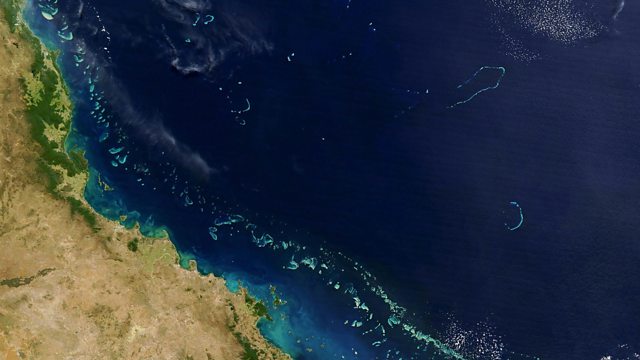Coral Bleaching Killing Great Barrier Reef
Coral bleaching; Bialowieza forest threat; Kite runner fossil; Project to drill into 'dinosaur crater'; Pig heart in baboon for 2 years; PenguinWatch; The man who knew infinity
The Great Barrier Reef in Australia is the largest natural living structure on earth and home to more than one thousand five hundred species of fish. But rising sea temperatures and this year’s powerful El Niño have caused the worst mass bleaching event the reef has ever seen. A recent aerial survey of its northern - and most pristine section - found that 95% of the top corals are now severely bleached. Scientists are still trying to find out where the south boundary of the bleaching even is. Our reporter Laura Hampton is on Lizard Island - a research station two hundred kilometres north of Cairns - to see first-hand how bad the situation really is.
Bialowieza Forest Threat
The Bialowieza forest in north east Poland straddles the border into Belarus. It’s a World Heritage Site, because it is the only lowland primeval forest in Europe – some estimates say it has been there for as long as 10, 000 years. It is home to 20,000 species of animals and plants, many of which are now extinct elsewhere in Europe, and the forest’s long history without human intervention makes it the most important in the northern hemisphere. Used as a hunting ground for kings and tsars, it has been protected for centuries, but now the Polish government has announced plans to increase logging in the forest. Concerned scientists have spoken out against the plan and written to the journal Nature outlining their very serious concerns. We speak to one of the authors Dr. Przemyslaw Chylarecki from the Institute of Zoology in Warsaw.
Kite Runner Fossil
A 430 million-year-old sea creature apparently dragged its offspring around on strings like kites. Reported in the journal PNAS, the many-legged, eyeless, 1cm animal is not directly related to any living species.
Project To Drill Into 'Dinosaur Crater' Gets Under Way
A joint UK-US-led expedition has got under way to drill into the Chicxulub Crater off the coast of Mexico. This is the deep scar made in the Earth's surface 66 million years ago by the asteroid that scientists believe hastened the end of the dinosaurs. They hope to learn more about the scale of the impact, and the environmental catastrophe that ensued.
Pig Heart Kept Beating In Baboon For Over Two Years
Scientists say they have kept a pig heart alive in a baboon for more than two years. They report their work in the journal Nature Communications, where they describe using a combination of gene modification and immune-supressing drugs to prevent rejection.
PenguinWatch
British scientists who have set up a network of penguin-monitoring cameras in Antarctica are asking the public to help them carry out their research. The Oxford University team is launching a new version of their ambitious project, PenguinWatch, in order to monitor and conserve Antarctica's penguin colonies.
The Man Who Knew Infinity
A new film about the Indian maths genius Srinivisa Ramanujan is due to be released in the UK – we discuss his life and work and how some of his theories are yet to be explained.
Presenter: Jack Stewart
Producer: Ania Lichtarowicz
Main Image: The Great Barrier Reef, NASA satellite image taken 06 August, 2004. (Credit HO / AFP / Getty Images)
Last on
More episodes
Previous
Broadcasts
- Thu 7 Apr 2016 21:32GMT���˿��� World Service except East and Southern Africa & News Internet
- Fri 8 Apr 2016 01:32GMT���˿��� World Service Americas and the Caribbean
- Fri 8 Apr 2016 02:32GMT���˿��� World Service Online, Europe and the Middle East & UK DAB/Freeview only
- Fri 8 Apr 2016 03:32GMT���˿��� World Service East Asia & South Asia only
- Fri 8 Apr 2016 04:32GMT���˿��� World Service Australasia
- Fri 8 Apr 2016 06:32GMT���˿��� World Service East and Southern Africa & Europe and the Middle East only
- Fri 8 Apr 2016 14:32GMT���˿��� World Service except News Internet
Podcast
-
![]()
Science In Action
The ���˿��� brings you all the week's science news.


